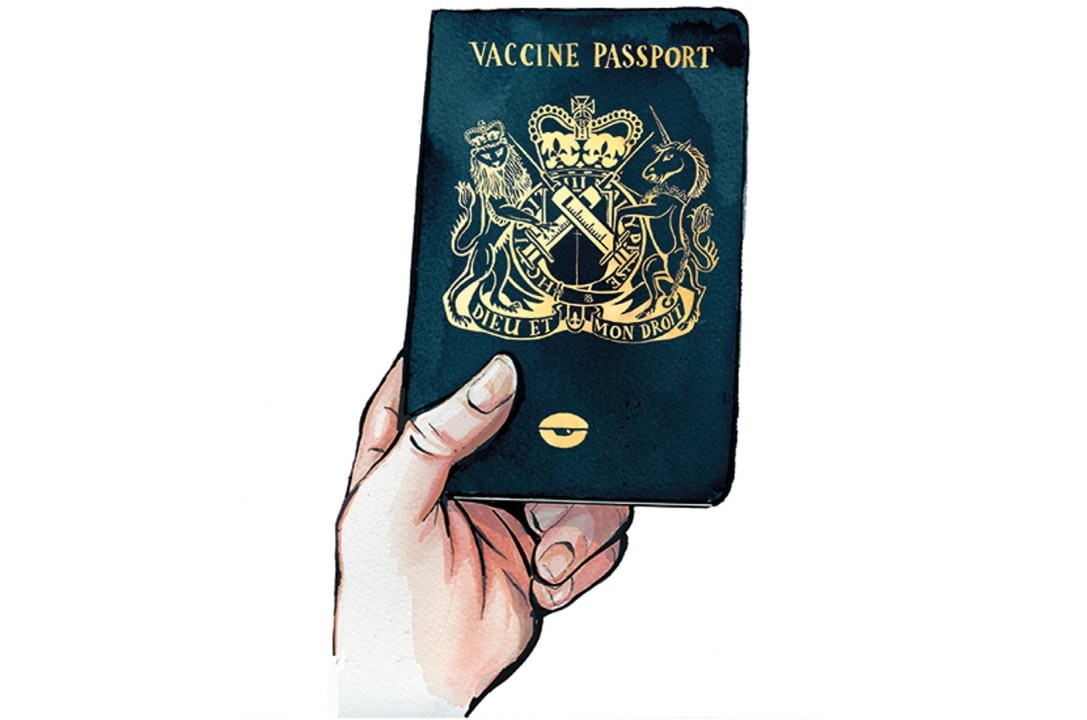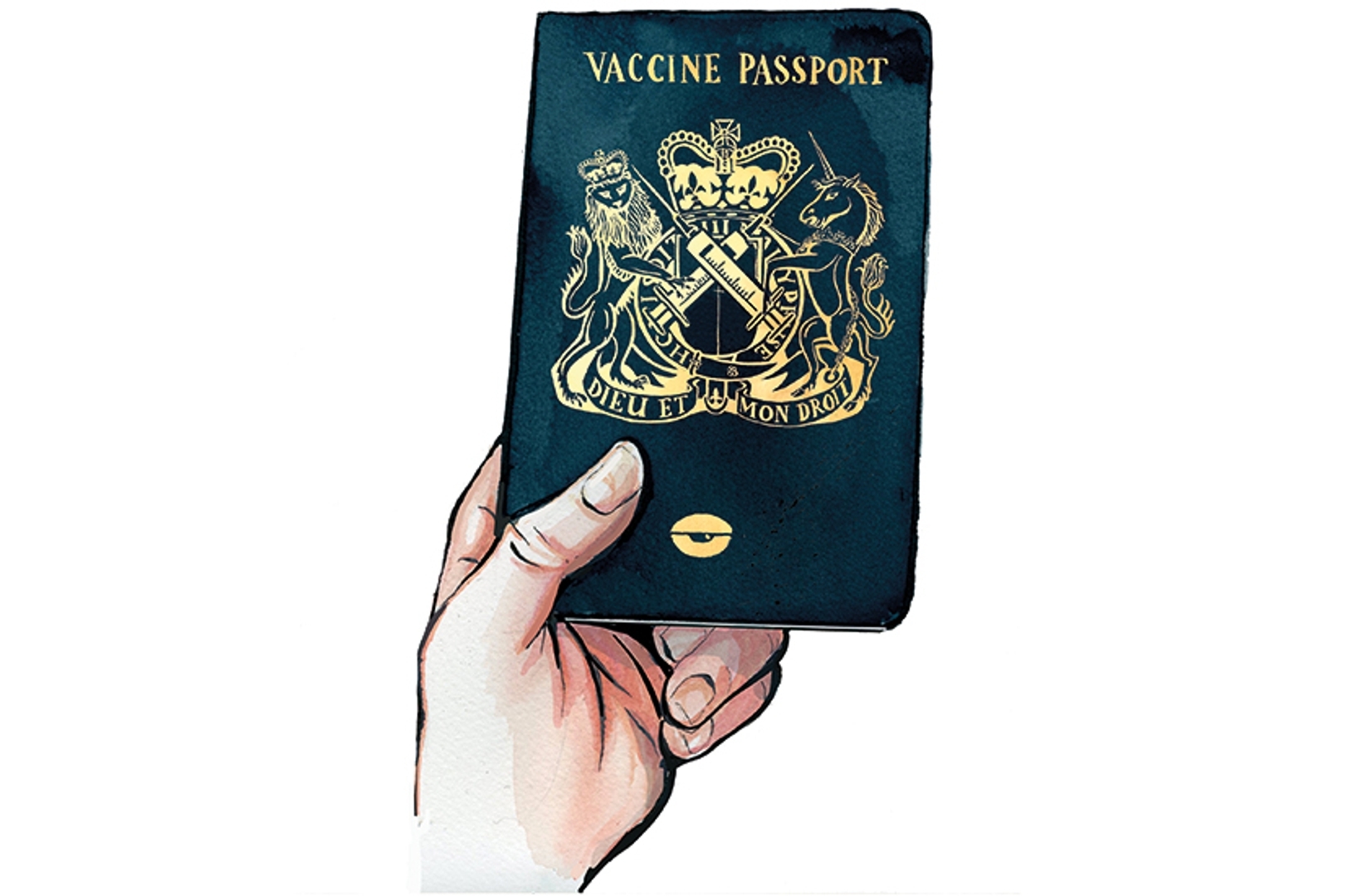Taking liberties
Sir: I feel that Matthew Parris is absolutely wrong about liberty (‘The libertarian case for vaccine passports’, 10 April). True liberty is that each individual has the possibility to live their life how they desire (within the law), taking full responsibility for any and all the risks they incur.
I am not responsible for anyone else’s health. To say that we have to stay indoors, wear masks, observe social distancing or have vaccinations because we would be killing others if we did not is blackmail. If you use the logic that the individual is responsible for the health of all other people then everyone who owns a car is directly responsible for every injury on the roads. The same reasoning implies that if someone else smokes, drinks too much or eats too much junk food then I am compelled to tell them to stop. Should I forbid anyone I know from making a bungee jump? We are exposed to risks at every moment of our lives. I alone pay the price for any decisions I make.
Howard Beach
Brighton, East Sussex
Free licence
Sir: I couldn’t agree more with Matthew Parris’s argument in support of vaccine passports: in essence that they would enable freedom rather than curtail it. To extend his motoring analogy, it’s quite respectable for a libertarian to oppose compulsory motorcycle helmets or car seatbelts. A vaccine passport is more like a driving licence. It doesn’t protect the holder but it does protect the rest of society, in that it proves that a driver has been taught how to control a car.
Paul Larsmon
Burbage, Wiltshire
A fitting salute
Sir: It’s poignant and moving that the peerless Jeremy Clarke, writing with such elegance and amusing sangfroid about his own serious illness, should have chosen this week (Low life, 10 April) to have topped and tailed his premonitory piece with his respect for the Duke of Edinburgh’s smartness on parade. RIP the Duke, and long life to Jeremy.
Alasdair Ogilvy
Stedham, West Sussex
Unnatural selection
Sir: Alexander Pelling-Bruce, quite reasonably, questions whether adding words to a plaque as part of a cultural ‘retain and explain’ policy can give full historical context (‘Monumental error’, 10 April). Then, in a reductive volte-face, he says that the Natural History Museum claims Darwin’s Beagle was a ‘colonialist scientific expedition’. The words are lifted, selectively and without context, from Natural History Museum principal curator Miranda Lowe’s thoughtful 2018 academic research paper about furthering understanding of the context in which many expeditionary voyages of that time were made.
Darwin’s contribution to science is unquestionable and honoured throughout the museum. Our curators and scientists understand, as he did, that the world is complex, dynamic and open-ended. Your columnist calls for an ‘academically robust process’. As an evidence-based world-leading scientific research institution he can be reassured that is our approach. Our principles are to acknowledge history, broaden perspectives and communicate and share. If Alexander would like to pop in when we reopen I’d be delighted to show him that in action.
Dr Doug Gurr
Director of the Natural History Museum
London SW7
Right on Kew
Sir: As a graduate of the three-year RBG Kew Diploma Course, I feel emboldened to comment on Charles Moore’s Notes (27 March and 10 April). When I trained there in the late 1970s, the Royal Botanic Gardens, Kew was part of the Ministry of Agriculture, Fisheries and Food. Soon after, it was granted independence from government control by the National Heritage Act of 1983. Governance is by a board of trustees, whose powers are defined in sections 23-29. These provisions are quite clear. The statutory purpose of Kew is purely scientific. Try as I may, I have been unable to find anything which permits the present programme of ‘de-colonisation’ announced by the director, Richard Deverell, and to which Charles Moore refers. Kew has no democratic mandate to spend taxpayers’ money on politically controversial projects. The price of its independence is to be non-political.
Ursula Buchan
Glapthorn, Northamptonshire
Beyond belief
Sir: There may be a growing number of people who identify as ‘spiritual and not religious’, as James Mumford points out, but there is a downside to this phenomenon (‘Believe it or not’, 3 April). Clearly organised religion needs to be mindful of the needs of this segment of the population and there is evidence that Covid may have lit the spark of spirituality in some people. Research during the first lockdown showed that more people started to pray during this period.
However, there are limits in people identifying as spiritual rather than religious. Religion provides a clear moral framework for adherents to subscribe to, whereas spirituality does not necessarily carry a consistent ethical template. Furthermore, religion offers structure for worship and a belief system, which is much easier to transmit to the next generation. It has a formidable track record of building communities, which provides such a source of support to people through good times and bad. Spirituality is a much looser identity and is unlikely to build strong community networks in the same way. The search for meaning, expressed through spirituality, is to be welcomed but it is unlikely to have the endurance and permanence of the great religions, which have stood the test of time over thousands of years.
Zaki Cooper
Trustee, Council of Christians and Jews
London SW1P







Comments